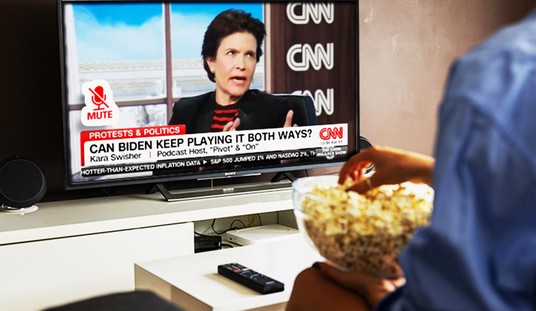This week I learned about something which has been around since the 80s without my ever having heard of it. (And believe me, I could have gone the rest of my life quite happily remaining in that blissfully ignorant state.) It’s called The Bechdel Test, named after a lesbian cartoonist who lives in Italy… Alison Bechdel. If, like me, you weren’t familiar with it, the premise is fairly simple. It’s a test applied to movies to see if they are “woke” enough in terms of feminist priorities. Do two named female characters at some point in the film have a conversation with each other which doesn’t involve talking about a man? If so, the film passes the test. If not, it’s dropped in the bin at the He Man Woman Haters Club.
Film critic Kyle Smith made the risky choice of writing a column about this phenomenon recently at National Review, blasting the test as a waste of time which does nothing to predict whether or not the film will be any good. (You’ll see why this was an unfortunate choice in a moment.) He compares it to a hypothetical “Cowboy test” which a film could pass by virtue of, well… having a cowboy in it.
Neither of these two tests gives you any hint as to the worth of a film, and furthermore neither of them tells you anything about a film’s general feminist wokeness. It doesn’t even tell you whether the film is entirely about a woman. Lots of films that have female protagonists fail the Bechdel Test — notably Alien 3; Run, Lola, Run; Breakfast at Tiffany’s (there is actual heated debate on this one, but if it passes it barely does so); and Gravity. The Princess Bride fails the Bechdel Test, as does Finding Nemo, and some argue that The Little Mermaid does, too. (Again, it might barely earn a passing grade.)
Lots of blockbusters with beloved female characters fail the Bechdel Test, including the original Star Wars trilogy, Avatar, and all of the Lord of the Rings films. So do many classic Hollywood films, from Citizen Kane to The Godfather, and lots of films directed by women, including Kathryn Bigelow’s The Hurt Locker, not to mention most of the Harry Potter movies adapted from J. K. Rowling’s novels. Showgirls, on the other hand, passes the test. Do feminists look at Showgirls and chalk that one up as a big win?
Smith goes on to point out that, women tend to write movies about relationships, and men tend to write movies about aliens and shootouts. This may go some ways toward explaining why movies written by guys make more money. Of course, a statement like that couldn’t be allowed to stand in modern society and the SJW wolves were quickly at Smith’s door. (Time Magazine)
Smith’s takedown was slammed on social media by many readers who disagreed with his assessment of the Bechdel Test and felt he missed the point.
“The Bechdel test isn’t meant to be like, the sole method for judging movies,” tweeted Sean McElwee, a political analyst. “It forces us to think more deliberately about sexism in art.”
“There are over 3.5 *BILLION* women in the world and movies consistently fail to portray them simply *talking* to each other,” another Twitter user wrote.
Several readers also mocked Smith’s comparison of women and cowboys. “Ah yes, cowboys, that underrepresented 50% of the population,” one wrote.
You can read Smith’s full analysis and the feminist upheaval which followed for yourselves at the links provided. For my part, I just wanted to touch on something which seems to go unsaid in this battle over the “correct” way to make films in Hollywood. For starters, I’ll draw on a quote from Smith’s article which informs us that one of Bechdel’s characters avers that she would only go to see movies which pass this test.
Allow me to now share the fact that I too have a personal test which I apply to my entertainment consumption and spending. I refuse to go to moves that suck.
This isn’t a question of whether or not there should be more women in films, directing films, writing screenplays or running studios. If that’s the case it’s a log which Hollywood needs to pluck from its own eye before peering into mine. The real question to be answered here is whether or not you are producing a product which is, by definition, a luxury item which people actually want to pay for. If there are two characters who need to have a particular conversation to move the plot forward and engage the audience, feel free to make them both women if you wish. Or both men. Or one of each. But if you are intentionally altering your film just to make sure that two women have a conversation which has little or nothing to do with the story just so you can pass some reductionist SJW litmus test then you are ruining your own film and its chances to do well at the box office.
Before you begin fretting over whether or not you have a sufficient number of this or that demographic characters performing some set of sufficiently “woke” tasks, try to make sure you are making a good movie. I’m not paying money and putting my backside in a theater seat for the purpose of counting conversations taking place on the screen based on gender. And I can assure you that the vast majority of the country isn’t doing that either. We want to be entertained and you, in return, would like to get our money. That’s how the deal works.
There have already been far too many movies with a lot of potential which turned out to be utter, unwatchable crap because the powers that be decided they needed to hammer home some progressive message rather than focusing on telling a good story. I’ve actually only seen four or five movies I actually enjoyed and would recommend to friends in the past year. Most of the ones which come out turn out to be dreck. And I couldn’t tell you if those few good films pass your Bechdel Test or not. I’m not going to go back and check because I don’t care. Focus on making good movies first using the best actors for each role. The rest will work itself out.








Join the conversation as a VIP Member